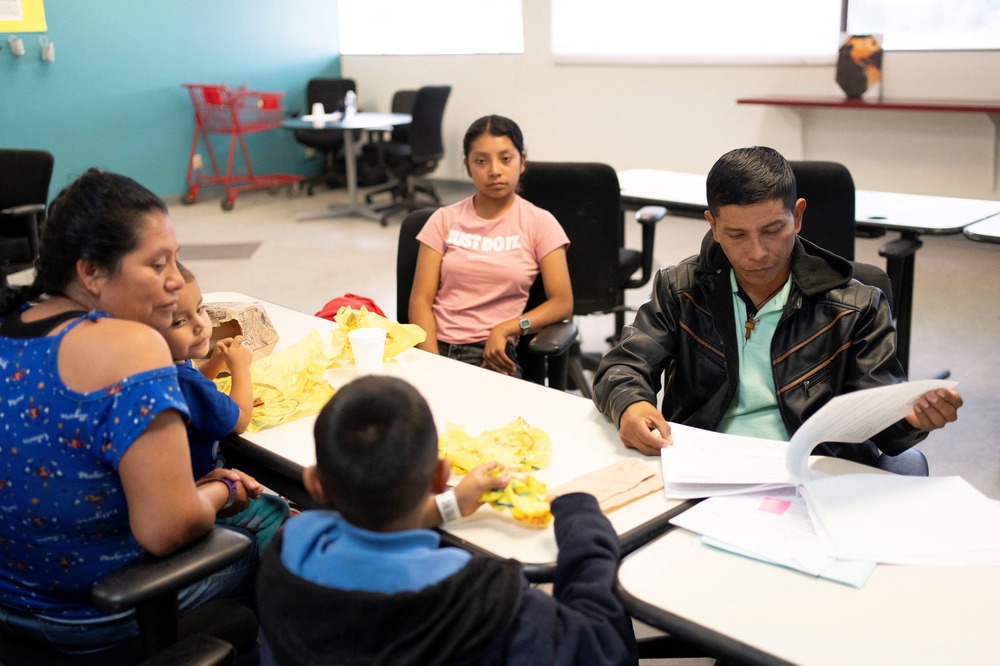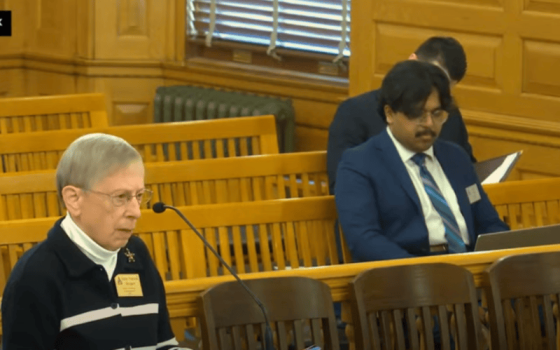
A migrant from Chiapas, Mexico, looks through his family's immigration paperwork at Casa Alitas in Tucson, Ariz., March 15, 2024. A federal judge in Texas Nov. 7 struck down a Biden administration program that gave a pathway to legalization and citizenship for certain undocumented spouses and children of U.S. citizens. (OSV News/Rebecca Noble, Reuters)
A federal judge in Texas on Nov. 7 struck down a Biden administration program to protect from deportation and provide a path to U.S. citizenship for hundreds of thousands of undocumented immigrants living in the country who are married to U.S. citizens.
The program, known as "Keeping Families Together," which sought to allow undocumented spouses and stepchildren of U.S. citizens to apply for a green card without first having to leave the country, was challenged by 16 Republican-led states that filed a lawsuit after applications were made available in August. At that time, a judge put the program on hold.
"Sadly, this court decision will likely end the program, as Trump will terminate it upon taking office," J. Kevin Appleby, senior fellow for policy at the Center for Migration Studies of New York and the former director of migration policy for the U.S. Conference of Catholic Bishops, told OSV News.
"Instead, his administration will start targeting the exact same families for deportation, separating U.S. citizen children from their parents," Appleby said. "Hopefully, Catholic advocates, including the U.S. bishops, will not pull their punches in opposing Trump's mass deportation and anti-asylum plans. History will mark how the church in the U.S. defends the rights of migrants in the years ahead."
Under the terms of the program, applicants must have resided in the U.S. for 10 or more years and be legally married to a U.S. citizen. Those approved by the Department of Homeland Security would have been permitted to remain in the U.S. for a three-year period to apply for permanent residency.
"Hopefully, Catholic advocates, including the U.S. bishops, will not pull their punches in opposing Trump's mass deportation and anti-asylum plans. History will mark how the church in the U.S. defends the rights of migrants in the years ahead," said J. Kevin Appleby, senior fellow for policy at the Center for Migration Studies of New York and the former director of migration policy for the U.S. Conference of Catholic Bishops.
In June, the White House had said the program would benefit "approximately half a million spouses of U.S. citizens, and approximately 50,000 noncitizen children under the age of 21 whose parent is married to a U.S. citizen."
But Judge J. Campbell Barker of the U.S. District Court for the Eastern District of Texas, who previously temporarily blocked the program, struck it down Nov. 7, arguing the administration exceeded its authority in creating the program.
The program would have been unlikely to remain in place once President-elect Donald Trump takes office in January.
Andrew Bailey, the attorney general of Missouri, one of the states that joined the lawsuit challenging the program, said in a post on X (formerly Twitter), "The court just granted our request to throw out the Biden-Harris administration's illegal parole-in-place program allowing illegal aliens to remain in our country after they have crossed the border. A huge win for the rule of law."
Advertisement
FWD.us, an immigration and criminal justice reform advocacy group, said in a post on X it is "deeply disappointed" by the ruling, arguing the program represented "a lifeline for hundreds of thousands of American families in desperate need of protection from being separated by our failed immigration system."
Previously, Bishop Mark J. Seitz of El Paso, Texas, who serves as chairman of the U.S. Conference of Catholic Bishops' Committee on Migration, praised the Biden administration rule at the time. He noted a similar program had been available to military service members and their families for several years.
In a June 18 statement, Seitz said, "We've seen the positive impacts such programs can have, not only for beneficiaries themselves but for the families, employers, and communities that rely on them," adding that the new program was "sure to yield similar benefits."
The Catholic Church's magisterium outlines the church's moral parameters on immigration. The Catechism of the Catholic Church instructs, "The more prosperous nations are obliged, to the extent they are able, to welcome the foreigner in search of the security and the means of livelihood which he cannot find in his country of origin."
At the same time, the church has also made clear human laws are also subject to divine limits. St. John Paul II's 1993 encyclical "Veritatis Splendor" ("Splendor of Truth") and 1995 encyclical "Evangelium Vitae" ("The Gospel of Life") — both quote the Second Vatican Council's teaching in "Gaudium et Spes," the Pastoral Constitution on the Church in the Modern World, which names "deportation" among various specific acts "offensive to human dignity" that "are a disgrace, and so long as they infect human civilization they contaminate those who inflict them more than those who suffer injustice, and they are a negation of the honor due to the Creator."
Back in June, Seitz emphasized that "legislators have a moral and patriotic duty to improve our legal immigration system, including the opportunities available for family reunification and preservation."
"A society is only as strong as its families, and family unity is a fundamental right," he said. "For the good of the country, Congress must find a way to overcome partisan divisions and enact immigration reform that includes an earned legalization program for longtime undocumented residents."






